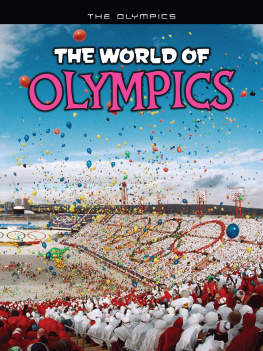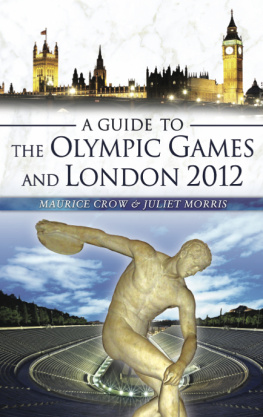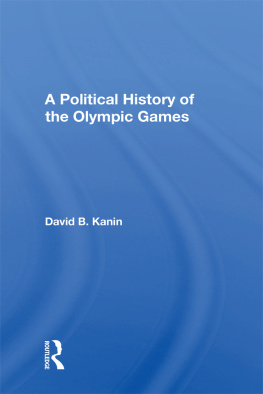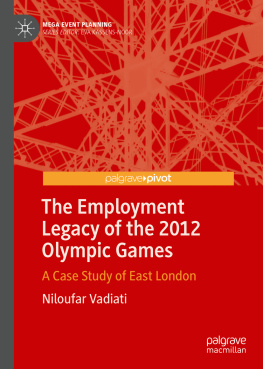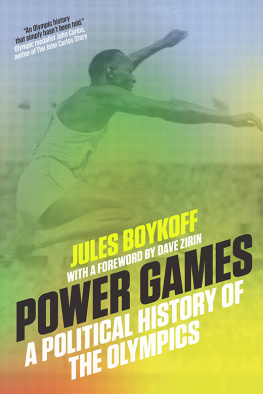Rule Britannia: Nationalism, Identity and the Modern Olympic Games
On 6 July 2005, the International Olympic Committee awarded the 2012 summer Olympic Games to the city of London, opening a new chapter in Great Britains rich Olympic history. Despite the prospect of hosting the summer Games for the third time since Pierre de Coubertins 1894 revival of the Olympic movement, the historical roots of British Olympism have received limited scholarly attention. With the conclusion of the 2008 Beijing Olympics and the passing of the baton to London, Rule Britannia remedies that oversight.
This book uncovers Britains early Olympic involvement, revealing how the British public, media, and leading governmental officials were strongly opposed to international Olympic competition. It explores how the British Olympic Association focused on three main factors in the midst of widespread national opposition: it embraced early Olympian spectacles as a platform for maintaining a sporting union with Ireland, it fostered a greater sense of imperial identity with Britains white dominions, and it undertook an ambitious policy of athletic specialization designed to reverse the nations waning fortunes in international sport.
This book was previously published as a special issue of International Journal of the History of Sport.
Matthew P. Llewellyn is an Assistant Professor in the department of Kinesiology at California State University, Fullerton. His work has appeared in a number of leading academic publications including the International Journal of the History of Sport, Journal of Sport History, Olympika: The International Journal of Olympic Studies and Contemporary British History. He earned a Ph.D. from Pennsylvania State University in the History and Philosophy of Sport.
Britain may have taught the world to play but, as Matthew Llewellyn argues in this excellent study, by the 1930s it had become a peripheral member of the international sporting community. One aspect of this was the reluctance of the British to follow other European nations and use the Olympic Games as a vehicle for the promotion of nationalism through sport. In this revisionist history Llewellyn clearly demonstrates that the British affinity for the Olympics is a very recent phenomenon. He shows, via detailed analysis of archival and newspaper sources, that from its origins the British Olympic Association struggled unsuccessfully to interest either the government or the British public in the Olympic movement. This work will be a healthy corrective to the historical hyperbole associated with the 2012 London Olympics.
Wray Vamplew, Department of Sports Studies, Stirling University, UK
Britains success in obtaining the 2012 Summer Olympic Games reemphasized its own belief that it had been a key player in the early history of the Olympic movement. Yet as Matt Llewellyn shows, in this fascinating myth-challenging and revisionist study, the reverse was true. Llewellyn explores the reasons for the longstanding British disinterest right up to 1939, and sets them into context, with an impressive depth and breadth of scholarly enquiry and sophisticated analysis. This is a work of value to all those with an interest in the history of sport and the Olympics, not just in the United Kingdom.
Mike Huggins, University of Cumbria, UK
Llewellyn provides a highly original survey of the early years of the Olympic movement in Britain which draws on Olympic and governmental archives as well as press reports. It is a stimulating and persuasive analysis of the personalities and politics involved. He takes us into key debates about sport and national identity, and allows us to see the decision-making processes that governed the funding of the early British Olympic teams. This book is a major contribution to the historiography of British sport, and it serves as a timely reminder that the British have always been ambivalent about the Olympic Games.
Martin Polley, University of Southampton, UK
First published 2012
by Routledge
2 Park Square, Milton Park, Abingdon, Oxon, OX14 4RN
Simultaneously published in the USA and Canada
by Routledge
711 Third Avenue, New York, NY 10017
Routledge is an imprint of the Taylor & Francis Group, an informa business
2012 Taylor & Francis
This book is a reproduction of the International Journal of the History of Sport, vol.28, issue 5. The Publisher requests to those authors who may be citing this book to state, also, the bibliographical details of the special issue on which the book was based.
All rights reserved. No part of this book may be reprinted or reproduced or utilised in any form or by any electronic, mechanical, or other means, now known or hereafter invented, including photocopying and recording, or in any information storage or retrieval system, without permission in writing from the publishers.
Trademark notice: Product or corporate names may be trademarks or registered trademarks, and are used only for identification and explanation without intent to infringe.
British Library Cataloguing in Publication Data
A catalogue record for this book is available from the British Library
ISBN13: 978-0-415-66390-8
Typeset in Times New Roman
by Taylor & Francis Books
Disclaimer
The publisher would like to make readers aware that the chapters in this book are referred to as articles as they had been in the special issue. The publisher accepts responsibility for any inconsistencies that may have arisen in the course of preparing this volume for print.
Contents
On January 1, 2010 Sport in the Global Society, created by Professor J.A. Mangan in 1997, was divided into two parts: Historical Perspectives and Contemporary Perspectives. These new categories involve predominant rather than exclusive emphases. The past is part of the present and the present is part of the past. The Editors of Historical Perspectives are Mark Dyreson and Thierry Terret.
The reasons for the division are straightforward. SGS has expanded rapidly since its creation with over one hundred publications in some twelve years. Its editorialteams will now benefit from sectional specialist interests and expertise. Historical Perspectives draws on IJHS monograph reviews, themed collections and conference/workshop collections. It is, of course, international in content.
Historical Perspectives continues the tradition established by the original incarnation of Sport in the Global Society by promoting the academic study of one of the most significant and dynamic forces in shaping the historical landscapes of human cultures. Sport spans the contemporary globe. It captivates vast audiences. It defines, alters, and reinforces identities for individuals, communities, nations, empires, and the world. Sport organizes memories and perceptions, arouses passions and tensions, and reveals harmonies and cleavages. It builds and blurs social boundaries, animating discourses about class, gender, race, and ethnicity. Sport opens new vistas on the history of human cultures, intersecting with politics and economics, ideologies and theologies. It reveals aesthetic tastes and energizes consumer markets.
By the end of the twentieth century a critical mass of scholars recognized theimportance of sport in their analyses of human experiences and Sport in the Global Society emerged to provide an international outlet for the worlds leading investigators of the subject. As Professor Mangan contended in the original series foreword: The story of modern sport is the story of the modern worldin microcosm; a modern global tapestry permanently being woven. Furthermore, nationalist and imperialist, philosopher and politician, radical and conservative have all sought in sport a manifestation of national identity, status and superiority. Finally for countless millions sport is the personal pursuit of ambition, assertion, well-being and enjoyment.


